综合英语教程2第四单元答案cultural encounters
复习精华 - 大学英语《综合教程2》Unit4

Have misgivings not be sure
Ex. 我对是否接受那项工作顾虑重重。 I have many misgivings about taking the job.
Fundamental basic
Ex. A knowledge of economics is fundamental to any understanding of this problem. There is a fundamental difference in attitude between these two politicians.
remoteness n.
Regardless of
without taking account of or worrying about Ex. I bought the book, regardless of the cost. Ex. The law requires equal treatment for all, regardless of race, religion or sex.
compromise with; ~ between reach/ come to/ arrive at a ~
find/ work out a ~
make a compromise OPP break a ~
Regarding prep.
(完整版)大学综合英语第二册基础英语2何兆熊课文及译文4cultureencounters

Unit4 TEXT ⅠCultural Encounters Susan Bassnett1. In what language are you usually surfing at Internet websites?2. What fun do you find on Internet?We live in an age of easy access to the rest of the world. 我们生活在一个交流非常便捷的时代Cheap flights mean that millions of people are able to visit places their parents could only dream about, while the Internet enables us to communicate with the remotest places and the traditional postal services are now referred to almost mockingly as "snail mail." 便宜的机票使得我们可以到那些我们的家长只能幻想的地方去,而网络使得我们可以跟最遥远地方的人们进行交流。
在这种情况下,传统邮政现在被称为蜗牛邮件系统。
When students go off back-packing, they can email their parents from Internet cafes in the Himalayas or from a desert oasis. 当学生们在背包远足的时候,他们可以用E-MAIL从喜马拉雅的网吧或者从沙漠里的绿洲给他们的家长发邮件。
And as for mobile phones—the clicking of text messaging at any hour of the day or night has become familiar to us all. 不管是白天还是晚上,我们也能通过手机来发短信。
Unit 4 Cultural Encounters课文翻译综合教程二精编资料
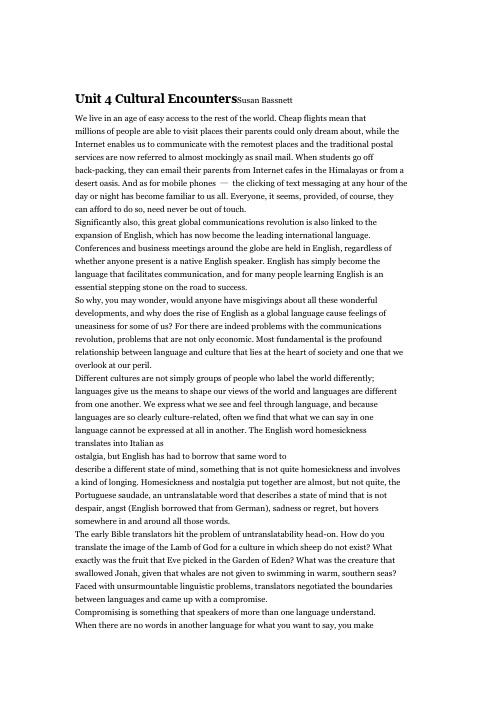
Unit 4 Cultural Encounters Susan BassnettWe live in an age of easy access to the rest of the world. Cheap flights mean thatmillions of people are able to visit places their parents could only dream about, while the Internet enables us to communicate with the remotest places and the traditional postal services are now referred to almost mockingly as snail mail. When students go offback-packing, they can email their parents from Internet cafes in the Himalayas or from a desert oasis. And as for mobile phones —the clicking of text messaging at any hour of the day or night has become familiar to us all. Everyone, it seems, provided, of course, they can afford to do so, need never be out of touch.Significantly also, this great global communications revolution is also linked to the expansion of English, which has now become the leading international language. Conferences and business meetings around the globe are held in English, regardless of whether anyone present is a native English speaker. English has simply become the language that facilitates communication, and for many people learning English is an essential stepping stone on the road to success.So why, you may wonder, would anyone have misgivings about all these wonderful developments, and why does the rise of English as a global language cause feelings of uneasiness for some of us? For there are indeed problems with the communications revolution, problems that are not only economic. Most fundamental is the profound relationship between language and culture that lies at the heart of society and one that we overlook at our peril.Different cultures are not simply groups of people who label the world differently; languages give us the means to shape our views of the world and languages are different from one another. We express what we see and feel through language, and because languages are so clearly culture-related, often we find that what we can say in one language cannot be expressed at all in another. The English word homesickness translates into Italian asostalgia, but English has had to borrow that same word todescribe a different state of mind, something that is not quite homesickness and involves a kind of longing. Homesickness and nostalgia put together are almost, but not quite, the Portuguese saudade, an untranslatable word that describes a state of mind that is not despair, angst (English borrowed that from German), sadness or regret, but hovers somewhere in and around all those words.The early Bible translators hit the problem of untranslatability head-on. How do you translate the image of the Lamb of God for a culture in which sheep do not exist? What exactly was the fruit that Eve picked in the Garden of Eden? What was the creature that swallowed Jonah, given that whales are not given to swimming in warm, southern seas? Faced with unsurmountable linguistic problems, translators negotiated the boundaries between languages and came up with a compromise.Compromising is something that speakers of more than one language understand.When there are no words in another language for what you want to say, you makeadjustments and try to approximate. English and Welsh speakers make adjustments regarding the colour spectrum in the grey / green / blue / brown range, since English hasfour words and Welsh has three. And even where words do exist, compromises still needto be made. The word democracy means completely different things in differentcontexts, and even a word like read which refers to a staple food item made of flourmeans totally different things to different people. The flat breads of Central Asia are along way away from Mother's Pride white sliced toasties, yet the word read has toserve for both.Inevitably, the spread of English means that millions of people are adding anotherlanguage to their own and are learning how to negotiate cultural and linguisticdifferences. This is an essential skill in today's hybrid world, particularly now when theneed for international understanding has rarely been so important. But even as morepeople become multilingual, so native English speakers are losing out, for they arebecoming ever more monolingual, and hence increasingly unaware of the differencesbetween cultures that languages reveal. Communicating in another language involves notonly linguistic skills, but the ability to think differently, to enter into another culture's mentality and shape language accordingly. Millions of people are discovering how tobridge cultures, while the English-speaking world becomes ever more complacent andcuts down on foreign language learning programmes in the mistaken belief that it isenough to know English.World peace in the future depends on intercultural understanding. Those best placedto help that process may not be the ones with the latest technology and state of the artmobile phones, but those with the skills to understand what lies in, under and beyond the words spoken in many different languages.文化冲突我们生活在一个交流非常便捷的时代。
Unit4 Cultural Encounters答案综合教程二
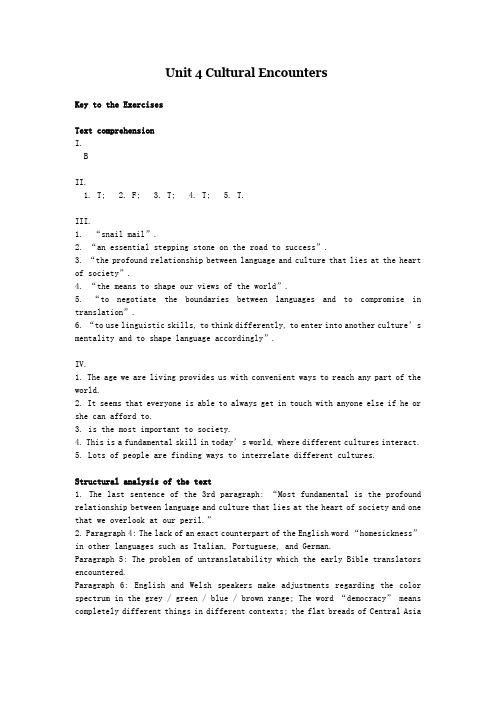
Unit 4 Cultural EncountersKey to the ExercisesText comprehensionI.BII.1. T;2. F;3. T;4. T;5. T.III.1. “snail mail”.2. “an essential stepping stone on the road to success”.3. “the profound relationship between language and cultur e that lies at the heart of society”.4. “the means to shape our views of the world”.5. “to negotiate the boundaries between languages and to compromise in translation”.6. “to use linguistic skills, to think differently, to enter into another culture’s m entality and to shape language accordingly”.IV.1. The age we are living provides us with convenient ways to reach any part of the world.2. It seems that everyone is able to always get in touch with anyone else if he or she can afford to.3. is the most important to society.4. This is a fundamental skill in today’s world, where different cultures interact.5. Lots of people are finding ways to interrelate different cultures.Structural analysis of the text1. The last sentence of the 3rd paragraph: “Mo st fundamental is the profound relationship between language and culture that lies at the heart of society and one that we overlook at our peril.”2. Paragraph 4: The lack of an exact counterpart of the English word “homesickness” in other languages such as Italian, Portuguese, and German.Paragraph 5: The problem of untranslatability which the early Bible translators encountered.Paragraph 6: English and Welsh speakers make adjustments regarding the color spectrum in the grey / green / blue / brown range; The word “democracy” means completely different things in different contexts; the flat breads of Central Asiaare a long way away from Mother’s Pride white sliced toasties, yet the word “bread” has to serve for both.VocabularyI. Phrase practice1. provided =as long as 假如,倘若need never be out of touch =can never fail to be reached 从不会失去联系2. regardless of =no matter 不管,不顾3. overlook at our peril =fail to notice at great risk 忽视……的危险或风险4. hovers somewhere in and around all those words =may be described by these words to varying degrees5. hit the problem of untranslatability head-on = were directly confronted with the problem that something in one language cannot be rendered into anotherII.1. stepping stone;2. at their peril;3. serve;4. mentality;5. staple;6. facilitating;7. messaging;8. hybrid.III. Word derivationFill in the blanks with the appropriate forms of the given words.1. economy2. accessible3. fundamentally4. homesick5. negotiable6. adjusted7. remoteness8. complacentlyIV.1. D;2. C;3. A;4. D;5. B;6. A;7. B;8. C.V. Synonym / AntonymGive a synonym or an antonym of the word underlined in each sentence in the sense it is used.1. Synonym: time, era, epoch2. Synonym: meetings3. Synonym: basic, fundamental4. Antonym: misshape5. Synonym: unavoidably6. Synonym: worry, concern, anxiety7. Antonym: hide, concealVI. PrefixWrite in each space one word that has the same prefix as underlined in the given word.1. unbelievable2. imperfect3. disagreement4. misplace5. malfunction6. enable7. surpass 8. submarineGrammarI. Complete the following sentences with the correct verb forms.1. helps2. hope; are enjoying; sunbathe; go; are going.3. is being.4. is typing5. am not eating.6. am reading7. are always leaving.8. go; belongs; wants; is using.9. is boiling.10. is putting; is rewiring; is building.II. Correct the errors.1. is passing → passes; is shooting → shoots.2. OK.3. are crying.4. OK.5. am knowing → know.6. am gathering → gather.7. work → am working.8. do → are; sneeze → sneezing.III.thank; are dispatching; regret; have; are contacting; hear; enclose/are enclosing; decide; have; are listed; regret; hope; enclose/are enclosing.IV.1. a. The speaker is complaining; b. The speaker gives a fact.2. a. am considering; b. have the opinion.3. a. It suggests a permanent nature; b. It suggests a temporary behaviour.4. a. is taking care of; b. have no objection to.5. a. am waiting for; b. believe.6. a. am waiting for; b. believe.V. Position of adjectivesRewrite the following descriptions putting the adjectives in the correct order.1. a large pair of red woolen socks2. a powerful new white German car3. a small rectangular grey Japanese radio4. a big modern concrete office building5. a medium size French stainless steel saucepan6. a superb medieval rose-shaped stained-glass window7. a prominent triangular red road sign8. a tiny black and white Chinese dogTranslationI.1.因此,你也许会问,为什么还有人会对这些绝妙的发展顾虑重重为什么英语成为世界语言会让一部分人惴惴不安2.不同的文化并不仅仅是给世界贴上不同标签的人群;语言给了我们塑造世界观的工具,而语言又是不一样的。
大学英语综合教程2 的课后练习答案unit4
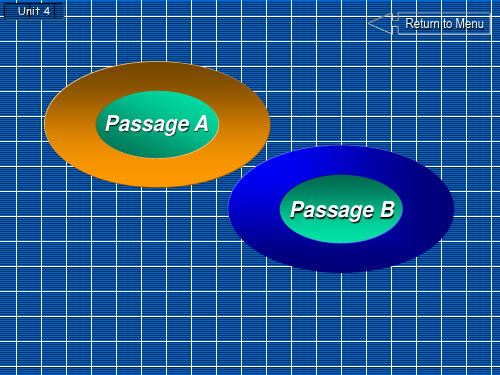
string n. — 1) a series of related or similar events Examples — 2) (a) narrow cord used to tie, fasten, etc.
• The curious boy asked a string of questions.
Reference:
Infertile people who cannot have babies otherwise, people suffering fatal diseases, and some religious people seeking immortality.
2. For what reasons do most governments prohibit cloning?
Unit 4
Return to Menu
Passage A
Passage B
Passage A
• Think Abou About It
• Write About It
1. What kind of people are in favor of carrying on with the cloning science?
And it’s not just Antinori and his team who are eager to go. A religious group called the Raelians believes cloning is the key to achieving immortality, and it, too, claims to have the necessary egg donors and volunteers willing to be implanted with cloned embryos. So what about tougher laws? Implanting cloned human embryos is already illegal in many countries but it will never be prohibited everywhere. In any case, the prohibition of cloning is more likely to drive it underground than stamp it out. Secrecy is already a problem. Antinori and his team are refusing to name the country they’ll be using as their base. Like it or not, the research is going ahead. Sooner or later we are going to have to decide whether regulation is safer than prohibition.
Unit4CulturalEncounters课文翻译综合教程二(20210110005936)
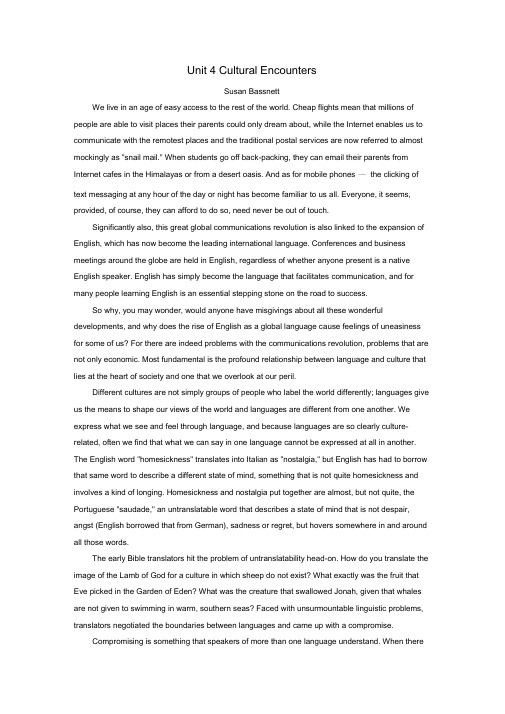
Unit 4 Cultural EncountersSusan BassnettWe live in an age of easy access to the rest of the world. Cheap flights mean that millions of people are able to visit places their parents could only dream about, while the Internet enables us to communicate with the remotest places and the traditional postal services are now referred to almost mockingly as "snail mail." When students go off back-packing, they can email their parents from Internet cafes in the Himalayas or from a desert oasis. And as for mobile phones —the clicking of text messaging at any hour of the day or night has become familiar to us all. Everyone, it seems, provided, of course, they can afford to do so, need never be out of touch.Significantly also, this great global communications revolution is also linked to the expansion of English, which has now become the leading international language. Conferences and business meetings around the globe are held in English, regardless of whether anyone present is a native English speaker. English has simply become the language that facilitates communication, and for many people learning English is an essential stepping stone on the road to success.So why, you may wonder, would anyone have misgivings about all these wonderful developments, and why does the rise of English as a global language cause feelings of uneasiness for some of us? For there are indeed problems with the communications revolution, problems that are not only economic. Most fundamental is the profound relationship between language and culture that lies at the heart of society and one that we overlook at our peril.Different cultures are not simply groups of people who label the world differently; languages give us the means to shape our views of the world and languages are different from one another. We express what we see and feel through language, and because languages are so clearly culture-related, often we find that what we can say in one language cannot be expressed at all in another. The English word "homesickness" translates into Italian as "nostalgia," but English has had to borrow that same word to describe a different state of mind, something that is not quite homesickness and involves a kind of longing. Homesickness and nostalgia put together are almost, but not quite, the Portuguese "saudade," an untranslatable word that describes a state of mind that is not despair, angst (English borrowed that from German), sadness or regret, but hovers somewhere in and around all those words.The early Bible translators hit the problem of untranslatability head-on. How do you translate the image of the Lamb of God for a culture in which sheep do not exist? What exactly was the fruit that Eve picked in the Garden of Eden? What was the creature that swallowed Jonah, given that whales are not given to swimming in warm, southern seas? Faced with unsurmountable linguistic problems, translators negotiated the boundaries between languages and came up with a compromise.Compromising is something that speakers of more than one language understand. When thereare no words in another language for what you want to say, you make adjustments and try to approximate. English and Welsh speakers make adjustments regarding the colour spectrum in the grey / green / blue / brown range, since English has four words and Welsh has three. And even where words do exist, compromises still need to be made. The word "democracy" means completely different things in different contexts, and even a word like "bread" which refers to a staple food item made of flour means totally different things to different people. The flat breads of Central Asia are a long way away from Mother's Pride white sliced toasties, yet the word "bread" has to serve for both.Inevitably, the spread of English means that millions of people are adding another language to their own and are learning how to negotiate cultural and linguistic differences. This is an essential skill in today's hybrid world, particularly now when the need for international understanding has rarely been so important. But even as more people become multilingual, so native English speakers are losing out, for they are becoming ever more monolingual, and hence increasingly unaware of the differences between cultures that languages reveal. Communicating in another language involves not only linguistic skills, but the ability to think differently, to enter into another culture's mentality and shape language accordingly. Millions of people are discovering how to bridge cultures, while the English-speaking world becomes ever more complacent and cuts down on foreign language learning programmes in the mistaken belief that it is enough to know English.World peace in the future depends on intercultural understanding. Those best placed to help that process may not be the ones with the latest technology and state of the art mobile phones, but those with the skills to understand what lies in, under and beyond the words spoken in many different languages.文化冲突我们生活在一个交流非常便捷的时代。
UnitCulturalEncounters答案综合教程二
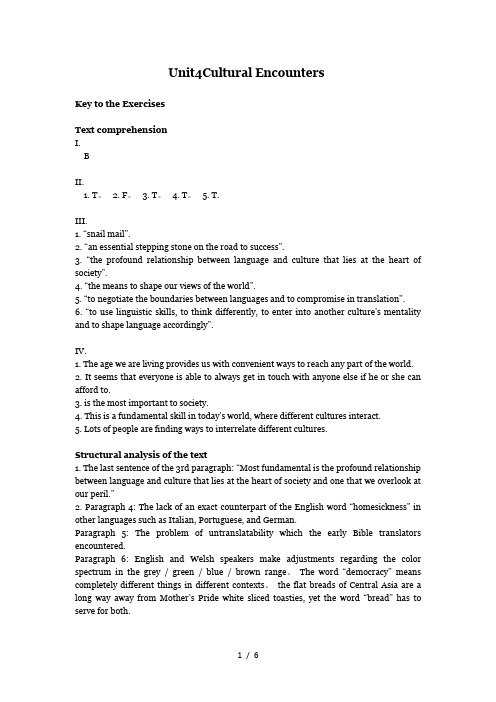
Unit4Cultural EncountersKey to the ExercisesText comprehensionI.BII.1. T。
2. F。
3. T。
4. T。
5. T.III.1. “snail mail”.2. “an essential stepping stone on the road to success”.3. “the profound relationship between language and culture that lies at the heart of society”.4. “the means to shape our views of the world”.5. “to negotiate the boundaries between languages and to compromise in translation”.6. “to use linguistic skills, to think differently, to enter into another culture’s mentality and to shape language accordingly”.IV.1. The age we are living provides us with convenient ways to reach any part of the world.2. It seems that everyone is able to always get in touch with anyone else if he or she can afford to.3. is the most important to society.4. This is a fundamental skill in today’s world, where different cultures interact.5. Lots of people are finding ways to interrelate different cultures.Structural analysis of the text1. The last sentence of the 3rd paragraph: “Most fundamental is the profound relationship between language and culture that lies at the heart of society and one that we overlook at our peril.”2. Paragraph 4: The lack of an exa ct counterpart of the English word “homesickness” in other languages such as Italian, Portuguese, and German.Paragraph 5: The problem of untranslatability which the early Bible translators encountered.Paragraph 6: English and Welsh speakers make adjustments regarding the color spectrum in the grey / green / blue / brown range。
Unit 4 Cultural Encounters课文翻译综合教程二
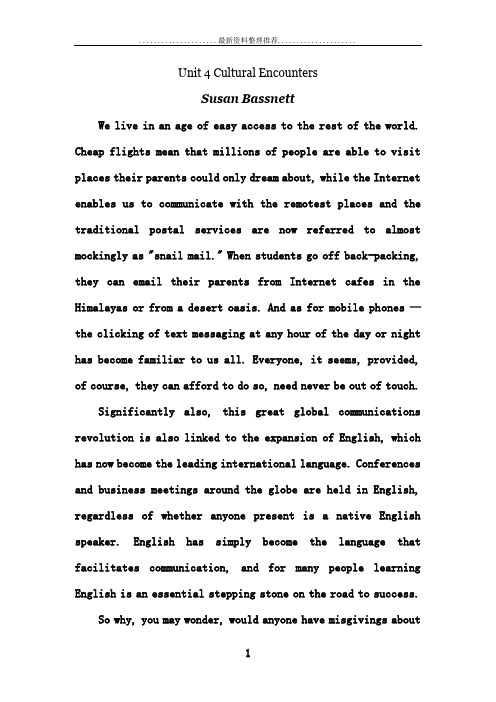
Unit 4 Cultural EncountersSusan BassnettWe live in an age of easy access to the rest of the world. Cheap flights mean that millions of people are able to visit places their parents could only dream about, while the Internet enables us to communicate with the remotest places and the traditional postal services are now referred to almost mockingly as "snail mail." When students go off back-packing, they can email their parents from Internet cafes in the Himalayas or from a desert oasis. And as for mobile phones —the clicking of text messaging at any hour of the day or night has become familiar to us all. Everyone, it seems, provided, of course, they can afford to do so, need never be out of touch.Significantly also, this great global communications revolution is also linked to the expansion of English, which has now become the leading international language. Conferences and business meetings around the globe are held in English, regardless of whether anyone present is a native English speaker. English has simply become the language that facilitates communication, and for many people learning English is an essential stepping stone on the road to success.So why, you may wonder, would anyone have misgivings aboutall these wonderful developments, and why does the rise of English as a global language cause feelings of uneasiness for some of us? For there are indeed problems with the communications revolution, problems that are not only economic. Most fundamental is the profound relationship between language and culture that lies at the heart of society and one that we overlook at our peril.Different cultures are not simply groups of people who label the world differently; languages give us the means to shape our views of the world and languages are different from one another. We express what we see and feel through language, and because languages are so clearly culture-related, often we find that what we can say in one language cannot be expressed at all in another. The English word "homesickness" translates into Italian as "nostalgia," but English has had to borrow that same word to describe a different state of mind, something that is not quite homesickness and involves a kind of longing. Homesickness and nostalgia put together are almost, but not quite, the Portuguese "saudade," an untranslatable word that describes a state of mind that is not despair, angst (English borrowed that from German), sadness or regret, but hovers somewhere in and around all those words.The early Bible translators hit the problem of untranslatability head-on. How do you translate the image of the Lamb of God for a culture in which sheep do not exist? What exactly was the fruit that Eve picked in the Garden of Eden? What was the creature that swallowed Jonah, given that whales are not given to swimming in warm, southern seas? Faced with unsurmountable linguistic problems, translators negotiated the boundaries between languages and came up with a compromise.Compromising is something that speakers of more than one language understand. When there are no words in another language for what you want to say, you make adjustments and try to approximate. English and Welsh speakers make adjustments regarding the colour spectrum in the grey / green / blue / brown range, since English has four words and Welsh has three. And even where words do exist, compromises still need to be made. The word "democracy" means completely different things in different contexts, and even a word like "bread" which refers to a staple food item made of flour means totally different things to different people. The flat breads of Central Asia are a long way away from Mother's Pride white sliced toasties, yet the word "bread" has to serve for both.Inevitably, the spread of English means that millions ofpeople are adding another language to their own and are learning how to negotiate cultural and linguistic differences. This is an essential skill in today's hybrid world, particularly now when the need for international understanding has rarely been so important. But even as more people become multilingual, so native English speakers are losing out, for they are becoming ever more monolingual, and hence increasingly unaware of the differences between cultures that languages reveal. Communicating in another language involves not only linguistic skills, but the ability to think differently, to enter into another culture's mentality and shape language accordingly. Millions of people are discovering how to bridge cultures, while the English-speaking world becomes ever more complacent and cuts down on foreign language learning programmes in the mistaken belief that it is enough to know English.World peace in the future depends on intercultural understanding. Those best placed to help that process may not be the ones with the latest technology and state of the art mobile phones, but those with the skills to understand what lies in, under and beyond the words spoken in many different languages.文化冲突我们生活在一个交流非常便捷的时代。
综合教程IIUnit 4 Cultural Encounters课文分析

CET-4 CET-6
TEM-4 TEM-8
2. In using English, do you sometimes have trouble finding the exact Chinese counterpart of an English word or expression, or vice versa? How do you solve the problem?
2. Compromising, in the author’s view, is a key notion in translation and thus also in intercultural communication. Numerous examples are used to explain this notion. Try to find these examples.
Detailed reading
2 Significantly also, this great global communications revolution is also linked to the expansion of English, which has now become the leading international language. Conferences and business meetings around the globe are held in English, regardless of whether anyone present is a native English speaker. English has simply become the language that facilitates communication, and for many an essential stepping stone on the road to success.
2 Unit4 Cultural Encounters答案综合教程二

Unit 4 Cultural EncountersKey to the ExercisesText comprehensionI.BII.1. T;2. F;3. T;4. T;5. T.III.1. “snail mail”.2. “an essential stepping stone on the road to success”.3. “the profound relationship between language and culture that lies at the heart of society”.4. “the means to shape our views of the world”.5. “to negotiate the boundaries between languages and to compromise in translation”.6. “to use linguistic skills, to think differently, to enter into another culture's mentality and to shape language accordingly”.IV.1. The age we are living provides us with convenient ways to reach any part of the world.2. It seems that everyone is able to always get in touch with anyone else if he or she can afford to.3. is the most important to society.4. This is a fundamental skill in today's world, where different cultures interact.5. Lots of people are finding ways to interrelate different cultures.Structural analysis of the text1. The last sentence of the 3rd paragraph: “Most fundamental is the profound relationship between language and culture that lies at the heart of society and one that we overlook at our peril.”2. Paragraph 4: The lack of an exact counterpart of the English word “homesickness”in other languages such as Italian, Portuguese, and German.Paragraph 5: The problem of untranslatability which the early Bible translators encountered.Paragraph 6: English and Welsh speakers make adjustments regarding the color spectrum in the grey / green / blue / brown range; The word “democracy” means AsiaCentral of breads flat the contexts; different in things different completelyare a long way away from Mother's Pride white sliced toasties, yet the word “bread”has to serve for both.VocabularyI. Phrase practice1. provided =as long as 假如,倘若need never be out of touch =can never fail to be reached 从不会失去联系2. regardless of =no matter 不管,不顾3. overlook at our peril =fail to notice at great risk 忽视……的危险或风险4. hovers somewhere in and around all those words =may be described by these words to varying degrees5. hit the problem of untranslatability head-on = were directly confronted with the problem that something in one language cannot be rendered into anotherII.1. stepping stone;2. at their peril;3. serve;4. mentality;5. staple;6. facilitating;7. messaging;8. hybrid.III. Word derivationFill in the blanks with the appropriate forms of the given words.1. economy2. accessible3. fundamentally4. homesick5. negotiable6. adjusted7. remoteness8. complacentlyIV.1. D;2. C;3. A;4. D;5. B;6. A;7. B;8. C.V. Synonym / AntonymGive a synonym or an antonym of the word underlined in each sentence in the senseit is used.1. Synonym: time, era, epoch2. Synonym: meetings3. Synonym: basic, fundamental4. Antonym: misshape5. Synonym: unavoidably6. Synonym: worry, concern, anxiety7. Antonym: hide, concealVI. PrefixWrite in each space one word that has the same prefix as underlined in the given word.1. unbelievable2.imperfect3. disagreement4.misplace5. malfunction6. enable7. surpass 8. submarineGrammarI. Complete the following sentences with the correct verb forms.1. helps2. hope; are enjoying; sunbathe; go; are going.3. is being.4. is typing5. am not eating.6. am reading7. are always leaving.8. go; belongs; wants; is using.9. is boiling.10. is putting; is rewiring; is building.II. Correct the errors.1. is passing → passes; is shooting → shoots.2. OK.3. are crying.4. OK.5. am knowing → know.6. am gathering → gather.7. work → am working.8. do → are; sneeze → sneezing.III.thank; are dispatching; regret; have; are contacting; hear; enclose/are enclosing; decide; have; are listed; regret; hope; enclose/are enclosing.IV.1. a. The speaker is complaining; b. The speaker gives a fact.2. a. am considering; b. have the opinion.3. a. It suggests a permanent nature; b. It suggests a temporary behaviour.4. a. is taking care of; b. have no objection to.5. a. am waiting for; b. believe.6. a. am waiting for; b. believe.V. Position of adjectivesRewrite the following descriptions putting the adjectives in the correct order.1. a large pair of red woolen socksa powerful new white German car2.3. a small rectangular grey Japanese radio4. a big modern concrete office building5. a medium size French stainless steel saucepan6. a superb medieval rose-shaped stained-glass window7. a prominent triangular red road sign8. a tiny black and white Chinese dogTranslationI.1.因此,你也许会问,为什么还有人会对这些绝妙的发展顾虑重重?为什么英语成为世界语言会让一部分人惴惴不安?2.不同的文化并不仅仅是给世界贴上不同标签的人群;语言给了我们塑造世界观的工具,而语言又是不一样的。
2-Unit4-Cultural Encounters答案综合教程二讲解学习

2-U n i t4-C u l t u r a l E n c o u n t e r s答案综合教程二Unit 4 Cultural EncountersKey to the ExercisesText comprehensionI.BII.1. T;2. F;3. T;4. T;5. T.III.1. “snail mail”.2. “an essential stepping stone on the road to success”.3. “the profound relationship between language and culture that lies at the heart of society”.4. “the means to shape our views of the world”.5. “to negotiate the boundaries between languages and to compromise in translation”.6. “to use linguistic skills, to think differently, to enter into another culture’s mentality and to shape language accordingly”.IV.1. The age we are living provides us with convenient ways to reach any part of the world.2. It seems that everyone is able to always get in touch with anyone else if he or she can afford to.3. is the most important to society.4. This is a fundamental skill in today’s world, where different cultures interact.5. Lots of people are finding ways to interrelate different cultures.Structural analysis of the text1. The last sentence of the 3rd paragraph: “Most fundamental is the profound relationship between language and culture that lies at the heart of society and one that we overlook at our peril.”2. Paragraph 4: The lack of an exact counterpart of the English word “homesickness” in other languages such as Italian, Portuguese, and German.Paragraph 5: The problem of untranslatability which the early Bible translators encountered.Paragraph 6: English and Welsh speakers make adjustments regarding the color spectrum in the grey / green / blue / brown range; The word “democracy” means completely different things in different contexts; the flat breads of Central Asia are a long way away from Mot her’s Pride white sliced toasties, yet the word “bread” has to serve for both.VocabularyI. Phrase practice1. provided =as long as 假如,倘若need never be out of touch =can never fail to be reached 从不会失去联系2. regardless of =no matter 不管,不顾3. overlook at our peril =fail to notice at great risk 忽视……的危险或风险4. hovers somewhere in and around all those words =may be described by these words to varying degrees5. hit the problem of untranslatability head-on = were directly confronted with the problem that something in one language cannot be rendered into anotherII.1. stepping stone;2. at their peril;3. serve;4. mentality;5. staple;6. facilitating;7. messaging;8. hybrid.III. Word derivationFill in the blanks with the appropriate forms of the given words.1. economy2. accessible3. fundamentally4. homesick5. negotiable6. adjusted7. remoteness8. complacentlyIV.1. D;2. C;3. A;4. D;5. B;6. A;7. B;8. C.V. Synonym / AntonymGive a synonym or an antonym of the word underlined in each sentence in the sense it is used.1. Synonym: time, era, epoch2. Synonym: meetings3. Synonym: basic, fundamental4. Antonym: misshape5. Synonym: unavoidably6. Synonym: worry, concern, anxiety7. Antonym: hide, concealVI. PrefixWrite in each space one word that has the same prefix as underlined in the given word. 1. unbelievable 2. imperfect3. disagreement4. misplace5. malfunction6. enable7. surpass 8. submarineGrammarI. Complete the following sentences with the correct verb forms.1. helps2. hope; are enjoying; sunbathe; go; are going.3. is being.4. is typing5. am not eating.6. am reading7. are always leaving.8. go; belongs; wants; is using.9. is boiling.10. is putting; is rewiring; is building.II. Correct the errors.1. is passing → passes; is shooting → shoots.2. OK.3. are crying.4. OK.5. am knowing → know.6. am gathering → gather.7. work → am working.8. do → are; sneeze → sneezing.III.thank; are dispatching; regret; have; are contacting; hear; enclose/are enclosing; decide; have; are listed; regret; hope; enclose/are enclosing.IV.1. a. The speaker is complaining; b. The speaker gives a fact.2. a. am considering; b. have the opinion.3. a. It suggests a permanent nature; b. It suggests a temporary behaviour.4. a. is taking care of; b. have no objection to.5. a. am waiting for; b. believe.6. a. am waiting for; b. believe.V. Position of adjectivesRewrite the following descriptions putting the adjectives in the correct order.1. a large pair of red woolen socks2. a powerful new white German car3. a small rectangular grey Japanese radio4. a big modern concrete office building5. a medium size French stainless steel saucepan6. a superb medieval rose-shaped stained-glass window7. a prominent triangular red road sign8. a tiny black and white Chinese dogTranslationI.1.因此,你也许会问,为什么还有人会对这些绝妙的发展顾虑重重?为什么英语成为世界语言会让一部分人惴惴不安?2.不同的文化并不仅仅是给世界贴上不同标签的人群;语言给了我们塑造世界观的工具,而语言又是不一样的。
Unit 4 Cultural Encounters Words and Expressions综合教程二
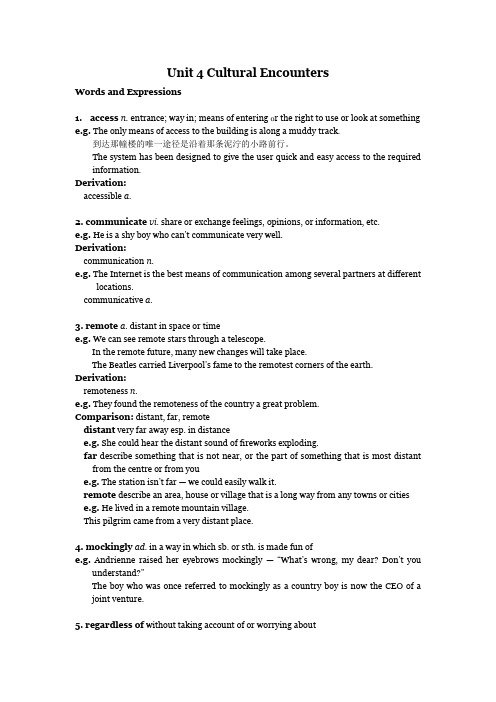
Unit 4 Cultural EncountersWords and Expressions1.access n.entrance; way in; means of entering o r the right to use or look at somethinge.g. The only means of access to the building is along a muddy track.到达那幢楼的唯一途径是沿着那条泥泞的小路前行。
The system has been designed to give the user quick and easy access to the required information.Derivation:accessible a.2. communicate vi. share or exchange feelings, opinions, or information, etc.e.g. He is a shy boy who can’t communicate very well.Derivation:communication n.e.g. The Internet is the best means of communication among several partners at differentlocations.communicative a.3. remote a.distant in space or timee.g. We can see remote stars through a telescope.In the remote future, many new changes will take place.The Beatles carried Liverpool’s fame to the remotest corners of the earth. Derivation:remoteness n.e.g. They found the remoteness of the country a great problem.Comparison: distant, far, remotedistant very far away esp. in distancee.g. She could hear the distant sound of fireworks exploding.far describe something that is not near, or the part of something that is most distant from the centre or from youe.g. The station isn’t far — we could easily walk it.remote describe an area, house or village that is a long way from any towns or cities e.g. He lived in a remote mountain village.This pilgrim came from a very distant place.4. mockingly ad. in a way in which sb. or sth. is made fun ofe.g. Andrienne raised her eyebrows mockingly —“What’s wrong, my dear? Don’t youunderstand?”The boy who was once referred to mockingly as a country boy is now the CEO of a joint venture.5. regardless of without taking account of or worrying aboute.g. I bought the book, regardless of the cost.尽管价钱挺高,我还是买了这本书。
全新版大学英语第二版综合教程2课后答案unit4-文档资料

virtual life and real life, but find both
unsatisfactory. 4
Language Sense Enhancement on P95
1-3: routine; for company; unemployment 4-6: externally ;drug abuse; restore 7-10: fled; gym ;set apart; appointments
8. She fights her boyfriend, misinterpreting his intentions because of the lack of emotional cues given by their typed dialogue.
9. Because we rely on co-works for company.
5. That people who grew used to a virtual life would feel an aversion to outside forms of socializing.
6. She gets overexcited, speaks too much, and interrupts others.
3. She could stay computer-assisted at home for weeks, going out only t get mail, newspapers and groceries.
4. They feel as if they had become one with the computer, and life seems to be unreal.
10. She calls people, arrangers to meet the few friends remaining in the City, gets to the gym, arranges interviews for stories, doctor’s appointments---anything to get her out of the house and connected with others.
unit4culturalencountersteachingplan综合教程二

Unit 4 Cultural EncountersTeaching PointsBy the end of this unit, students are supposed to1)grasp the idea revealed in the writing and make clear the structure of the wholepassage through an intensive reading of Cultural Encounters.2)comprehend the deductive approach of argumentation development.3)get a list of new words and structures and use them freely in conversation andwriting.4)be aware of the importance and significance of intercultural understanding andempathy.Topics for discussion1)In what language are you usually surfing at Internet websites?2)What fun do you find on Internet?3)Have you ever encounter any intercultural misunderstanding? If have, can youlist the reasons that account for the misunderstandings?Cultural information1. QuotesHuman beings draw close to one another by their common nature, but habits and customs keep them apart.— Confucius2. Cross-cultural Communication StrategiesThe key to effective cross-cultural communication is knowledge.◊First, it is essential that people understand the potential problems of cross-cultural communication, and make a conscious effort to overcome these problems.◊Second, it is important to assume that one’s efforts will not always be successful, and adjust one’s behavior appropriately.Suggestions for heated conflicts is to stop, listen, and think. This helps in cross-cultural communication as well.◊ When things seem to be going badly, stop or slow down and think.◊Active listening can sometimes be used to check this out —by repeating what one thinks he or she heard, one can confirm that one understands the communication accurately.◊ Often intermediaries who are familiar with both cultures can be helpful in cross-cultural communication situations. They can translate both the substance and the manner of what is said. They may explain the problem, and make appropriate procedural adjustments.Text ICultural EncountersSusan BassnettGlobal ReadingI. Text analysis1.Which sentence is the thesis statement?The last sentence of the 3rd paragraph: “Most fundamental is the profound relationship between language and culture that lies at the heart of society and one that we overlook at our peril.”promising, in the author’s view, is a key notion in translation and thusalso in intercultural communication. Numerous examples are used to explain this notion. Try to find these examples.Paragraph 4: The lack of an exact counterpart of the English word “homesickness” in other languages such as Italian, Portuguese, and German.Paragraph 5: The problem of untranslatability which the early Bible translators encountered.Paragraph 6: English and Welsh speakers make adjustments regarding the color spectrum in the grey / green / blue / brown range; the flat breads of Central Asia are a long way away fr om Mother’s Pride white sliced toasties, yet the word “bread” has to serve for both.II. Structural analysis1.What type of writing is this essay? And what’s the main strategy the authoradopt to develop the body of the essay?It is a piece of argumentation. Abundant examples are provided to support her argument in the body of the essay.2.Divide the text into parts by completing the table.Detailed ReadingParagraphs 1-3Questions:1. What do cheap flights and the Internet mean to people today? (Paragraph 1) Cheap flights mean that millions of people can afford to visit places their parents could only dream about, while the Internet means that numerous people are able to communicate with the remotest places with great ease.2. Exemplify and explain that English has become the most important international language. (Paragraph 2)Conferences and business meetings around the globe are held in English, regardless of whether anyone present is a native English speaker. English has simply become the language that facilitates communication, and for many people learning English is an essential stepping stone on the road to success.Paragraphs 4-7Questions:1. Supply specific examples to prove that language and culture are closely related to each other.(Paragraph 4)Numerous examples show that language and culture are interrelated. Take a look at some English idioms and see how different their Chinese counterparts are:a drop in the ocean 沧海一粟to laugh one’s head off 笑掉大牙to shed crocodile tears 猫哭老鼠to spend money like water 挥金如土to be born with a silver spoon in one’s mouth 生长在富贵人家2. Explain and illustrate what “compromising”and “the spread of English”mean. (Paragraph 7)For “compromising,” refer to Paragraph 6 of the text. A s to “the spread of English,” a typical example is the spread of English in China. Compared with other nations, China boasts the largest number of people who have learned or are learning English. Chinese learners of English are learning how to overcome cultural and linguistic differences. In today’s China, the mastery of English has become an important skill which is of great use and value in all walks of life.Paragraph 8Questions:1. According to the writer, what is the great function of intercultural understanding? (Paragraph 8)The writer says, “World peace in the future depends on intercultural understanding.” In other words, intercultural understanding will play a most important role in the promotion of world peace in the future.2. Who will probably be most able to help the process of world peace in the future? (Paragraph 8)Those who are most competent to contribute to the process of world peace probably are those who have acquired the skills to understand the literal, implied, figurative, or cultural meanings of the words spoken in many different languages.Text IIDoes Your Body Betray You?Lead-in Questions1.What is body language? What kinds of body language can you think of?2.Can you tell the meanings of some common facial expressions or gestures?Main ideasDoes Your Body Betray you,the title indicates that changes in your body position and movements show what you are feeling or thinking. In fact, three-quarters of the social meaning of a typical two-person exchange is carried by nonverbal cues, though most of the time we are not aware that we are doing it. Nonverbal signals differ from culture to culture at least as much as one language differs from another, and so we need to realize that knowledge of a foreign language is incomplete unless it extends to the nonverbal signals. So, it is essential to get some knowledge about nonverbal communication. The passage provides us with some commonly-used body language cues and their interpretations through a list of examples.Notes1. body language (Paragraph 1): Body language is communication by means of facial expressions, gestures, postures, and other wordless signals. Body language also includes grooming habits, hair and clothing styles, and such practices as tattooing and body piercing. Body language communicates unspoken information about people’s identity, relationships, and thoughts, as well as moods, motivation, and attitudes. It plays an essential role in all interpersonal relationships, such as childcare, politics, teaching, and public speaking. The scientific study of body language is called kinesics.2. be telling the world a totally different story(Paragraph 1): be meaning entirely different things from what you are saying3. ... however cool and contained you think you’re being, there is a host of little telltale gestures and expressions that give you away ... (Paragraph 2): …however successfully you think you are managing to appear calm and self-controlled, a large number of slight changes in your body position and movements provide evidence about what you are feeling or thinking ...4. ... you’re a bundle of nerves. (Paragraph 4): ... you are feeling very nervous.5. invading your space (Paragraph 5): intruding into your air spaceStudies by experts suggest that man walks around inside a kind of private bubble, which represents the amount of air space he feels he must have between himself and other people. To invade is to affect someone in an unwanted and annoying way. .Does that give you an excuse to invade my privacy?6. keep them at arm’s length (Paragraph 5): avoid developing a relationship with them. If you’re wise, you’ll keep Mrs. Jones at arm’s length. She’s the worst gossip in the village.7. You want to block out the speaker’s words … (Paragraph 7): You want to stop yourself thinking about what the speaker says …8. in your heart of hearts (Paragraph 8): If you know, feel, or believe something in your heart ofhearts, you are sure about it although you may not admit it.. Claire knew in her heart of hearts that she would never go back there.9. trying to shield her listener from what she’s saying (Paragraph 9): trying to protect herlistener from being hurt by what she’s saying. Several officials are accused of trying to shield the General from US federal investigators.10. rather than (Paragraph 11): instead of. Rather than squeezing your own oranges, have you tried buying packs of orange juice?11. in a quandary (Paragraph 12): unable to decide what to do about a difficultproblem or situation.The city council is in a quandary over whether to raise taxes or not.Questions for discussion1. What does the title of the text mean?2. What does the author mean when he says “three-quarters of our knowledge about them comes via our eyes rather than our ears”?3. How can one’s gestures and expressions give him / her away?4. What conclusion can we draw from such instinctive behaviour as fiddling and arm folding?5. What is the main idea of LOVE SIGNS?6. Why doesn’t the author spell out a precise vocabulary of gestures?7. What implications does the study of body language have for learning a foreign language?8. Observe people near you for several days, looking for uses of body language. Try also to be conscious of your own use of body language. What conclusion can you draw?Key to questions for discussion1. Changes in your body position and movements show what you are feeling or thinking.2. Three-quarters of the social meaning of a typical two-person exchange is carriedby nonverbal cues.3. All of us communicate with one another nonverbally, as well as with words. Most of the time we are not aware that we are doing it. Body language provides evidence about how the human mind processes information.4. People feel safer behind some kind of physical barrier. If a social situation is in any way threatening, then there is an immediate urge to set up such a barricade.5. When two people look searchingly into each other’s eyes, emotions are heightenedand the relationship becomes more intimate. Therefore, we carefully avoid this, except in appropriate circumstances.6. The author looks for patterns in the context, not for an isolated meaningfulgesture. Besides, there are several possible interpretations for a single gesture.For example, when a student in conversation with a professor holds the older man’s eyes a little longer than is usual, it can be a sign of respect and affection rather than a sign of love.7. Nonverbal signals differ from culture to culture at least as much as one language differs from another, and so we need to realize that knowledge of a foreign language is incomplete unless it extends to the nonverbal signals.Memorable QuotesRead the following quotes and analyze the purposes of culture advanced by Matthew Arnold.Guidance:The following quotes are from Culture and Anarchy—a series of periodical essays by Matthew Arnold. In the book, he advanced that “Culture ... is a study of perfection”. He further wrote that: “It (Culture) seeks to do away with classes; to make the best that has been thought and known in the world current everywhere; to make all men live in an atmosphere of sweetness and light ...”1. Culture has one great passion —the passion for sweetness and light. It has one even yet greater, the passion for making them prevail.— Matthew Arnold Matthew Arnold (1822–1888) was an English poet.Paraphrase: Part of the essence of culture is the love of beauty and unbiased intelligence. The even more essential part of culture is to make the best ideas —the love of beauty and unbiased intelligence, to be the most common.2. The men of culture are the true apostles of equality.— Matthew Arnold Paraphrase: The men of culture diffuse the best ideas regardless of class.。
unit4culturalencounters课文翻译综合教程二

U n i t4C u l t u r a l E n c o u n t e r s课文翻译综合教程二-CAL-FENGHAI.-(YICAI)-Company One1Unit 4 Cultural EncountersSusan BassnettWe live in an age of easy access to the rest of the world. Cheap flights mean that millions of people are able to visit places their parents could only dream about, while the Internet enables us to communicate with the remotest places and the traditional postal services are now referred to almost mockingly as "snail mail." When students go off back-packing, they can email their parents from Internet cafes in the Himalayas or from a desert oasis. And as for mobile phones — the clicking of text messaging at any hour of the day or night has become familiar to us all. Everyone, it seems, provided, of course, they can afford to do so, need never be out of touch.Significantly also, this great global communications revolution is also linked to the expansion of English, which has now become the leading international language. Conferences and business meetings around the globe are held in English, regardless of whether anyone present is a native English speaker. English has simply become the language that facilitates communication, and for many people learning English is an essential stepping stone on the road to success.So why, you may wonder, would anyone have misgivings about all these wonderful developments, and why does the rise of English as a global language cause feelings of uneasiness for some of us For there are indeed problems with the communications revolution, problems that are not only economic. Most fundamental is the profound relationship between language and culture that lies at the heart of society and one that we overlook at our peril.Different cultures are not simply groups of people who label the world differently; languages give us the means to shape our views of the world and languages are different from one another. We express what we see and feel through language, and because languages are so clearly culture-related, often we find that what we can say in one language cannot be expressed at all in another. The English word "homesickness" translates into Italian as "nostalgia," but English has had to borrow that same word to describe a different state of mind, something that is not quite homesickness and involves a kind of longing. Homesickness and nostalgia put together are almost, but not quite, the Portuguese "saudade," an untranslatable word that describes a state of mind that is not despair, angst (English borrowed that from German), sadness or regret, but hovers somewhere in and around all those words.The early Bible translators hit the problem of untranslatability head-on. How do you translate the image of the Lamb of God for a culture in which sheep do not exist What exactly was the fruit that Eve picked in the Garden of Eden What was the creature that swallowed Jonah, given that whales are not given to swimming in warm, southern seas Faced with unsurmountable linguistic problems, translators negotiated the boundaries between languages and came up with a compromise.Compromising is something that speakers of more than one language understand. When there are no words in another language for what you want to say, you make adjustments and try to approximate. English and Welsh speakers make adjustments regarding the colour spectrum in the grey / green / blue / brown range, since English has four words and Welsh has three. And even where words do exist, compromises still need to be made. The word "democracy" means completely different things in different contexts, and even a word like "bread" which refers to a staple food item made of flour means totally different things to different people. The flat breads of Central Asia are a long way away from Mother's Pride white sliced toasties, yet the word "bread" has to serve for both.Inevitably, the spread of English means that millions of people are adding another language to their own and are learning how to negotiate cultural and linguistic differences. This is an essential skill in today's hybrid world, particularly now when the need for international understanding has rarely been so important. But even as more people become multilingual, so native English speakers are losing out, for they are becoming ever more monolingual, and hence increasingly unaware of the differences between cultures that languages reveal. Communicating in another language involves not only linguistic skills, but the ability to think differently, to enter into another culture's mentality and shape language accordingly. Millions of people are discovering how to bridge cultures, while the English-speaking world becomes ever more complacent and cuts down on foreign language learning programmes in the mistaken belief that it is enough to know English.World peace in the future depends on intercultural understanding. Those best placed to help that process may not be the ones with the latest technology and state of the art mobile phones, but those with the skills to understand what lies in, under and beyond the words spoken in many different languages.文化冲突我们生活在一个交流非常便捷的时代。
- 1、下载文档前请自行甄别文档内容的完整性,平台不提供额外的编辑、内容补充、找答案等附加服务。
- 2、"仅部分预览"的文档,不可在线预览部分如存在完整性等问题,可反馈申请退款(可完整预览的文档不适用该条件!)。
- 3、如文档侵犯您的权益,请联系客服反馈,我们会尽快为您处理(人工客服工作时间:9:00-18:30)。
Cultural EncountersText comprehensionI. B II. 1. T; 2. F; 3. T; 4. T; 5. T.III.1. “snail mail”.2. “an essential stepping stone on the road to success”.3. “the profound relationship between language and culture that lies at the heart of society”.4. “the means to shape our views of the world”.5. “to negotiate the boundaries between languages and to compromise in translation”.6. “to use linguistic skills, to think differently, to enter into another culture’s mentality and to shape language accordingly”.IV.1. with convenient ways to reach any part of the world.2. It seems that everyone is able to always get in touch with anyone else if he or she can afford to.3. is the most important to society.4. a fundamental skill in today’s world, where different cultures interact.5. are finding ways to interrelate different cultures.Structural analysis of the text1. The last sentence of the 3rd paragraph: “Most fundamental is the profound relationship between language and culture that lies at the heart of society and one that we overlook at our peril.”2. Paragraph 4: The lack of an exact counterpart of the English word “homesickness” in other languages such as Italian, Portuguese, and German.Paragraph 5: The problem of untranslatability which the early Bible translators encountered. Paragraph 6: English and Welsh speakers make adjustments regarding the color spectrum in the grey / green / blue / brown range; The word “democracy” means completely different things in different contexts; the flat breads of Central Asia are a long way away from Mother’s Pridewhite sliced toasties, yet the word “bread” has to serve for both.Part One. V ocabulary AnalysisI. Phrase practice1. provided =as long as 假如,倘若need never be out of touch =can never fail to be reached从不会失去联系2. regardless of =no matter 不管,不顾3. overlook at our peril =fail to notice at great risk忽视……的危险或风险4. hovers somewhere in and around all those words =may be described by these words to varying degrees5. hit the problem of untranslatability head-on = were directly confronted with the problem that something in one language cannot be rendered into anotherII.1. stepping stone;2. at their peril;3. serve;4. mentality;5. staple;6. facilitating;7. messaging;8. hybrid.III. Word derivationFill in the blanks with the appropriate forms of the given words.1. The country is trying to move from a centrally planned economy (economic) to one basically geared to the needs of the market.2. There are no good roads in the area, so most of the ranches are only accessible (access) by jeep or other off-road vehicles.3. The two approaches are so fundamentally (fundamental) different that it is surprising that they have both been successful.4. They spent much time comforting the homesick (homesickness) children at the beginning of the summer camp.5. We are looking for an experienced journalist to join the news teams. The salary is negotiable (negotiate).6. The amount of any of these ingredients can be adjusted (adjustment) according to your taste.7. The remoteness (remote) of the house was the only thing that made them hesitate about buying it.8. He parked the car and smiled at her, complacently (complacent) assuming he had passed the test.1. economic a.经济学的;经济的;有利可图的economical a.节俭的;经济的,合算的economics n.经济学economist n.经济学家economy n.节约;经济2. access n.通道,入口accessible a.可得到的;易接近的,可进入的accessibility n.可以得到;易接近3. fundamental a.基本的,根本的;重要的fundamentalism n.原教旨主义fundamentalist n.信奉正统派基督教的人fundamentally ad.从根本上;基本地4. homesick a.想家的homesickness n.乡愁,思乡病5. negotiate v.谈判,协商,交涉negotiable a.可磋商的,可协商的negotiation n.谈判,协商negotiator n.磋商者,交涉者6. adjust v.调整,调节;使适应adjustable a.可调整的adjustment n.调整7. remote a.偏僻的,遥远的,远程的remoteness n.远离,远隔,偏僻8. complacent a.满足的,自满的,得意的complacently ad.满足地,自满地,沾沾自喜地complacency n.自满,沾沾自喜IV.1. D;2. C;3. A;4. D;5. B;6. A;7. B;8. C.V. Synonym / AntonymGive a synonym or an antonym of the word underlined in each sentence in the sense it is used. 1. We live in an age of easy access to the rest of the world.Synonym: time, era, epoch2. Conferences and business meetings around the globe are held in English, regardless of whether anyone present is a native English speaker.Synonym: meetings3. English has simply become the language that facilitates communication, and for many people learning English is an essential stepping stone on the road to success.Synonym: basic, fundamental4. Different cultures are not simply groups of people who label the world differently; languages give us the means to shape our views of the world and languages are different from one another. Antonym: misshape5. Inevitably, the spread of English means that millions of people are adding another language to their own and are learning how to negotiate cultural and linguistic differences.Synonym: unavoidably6. Why does the rise of English as a global language cause feelings of uneasiness for some of us? Synonym: worry, concern, anxiety7. But even as more people become multilingual, so native English speakers are losing out, for they are becoming ever more monolingual, and hence increasingly unaware of the differences between cultures that languages reveal.Antonym: hide, conceal4 PrefixWrite in each space one word that has the same prefix as underlined in the given word.1. unreliable unbelievable2. impatient imperfect3. disapproval disagreement4. mistake misplace5. maltreat malfunction6.enrich enable7. surmount surpass8.subordinate submarine1. Explanation:un- : not or the opposite ofe.g. unable, unhappy, unknown2. Explanation:in- / il- / im- / ir- : not or the opposite ofe.g. impolite, infinite, illogical, irrelevance3. Explanation:dis- : not or the opposite ofe.g. dishonest, disadvantage, disappear4. Explanation:mis- : bad or wronge.g. misinterpret, misbehavior, mischance, misconceive5. Explanation:mal- : bad or not correcte.g. malpractice, malodorous, malformation6. Explanation:en- / em- : to cause to be; to put into the thing or condition mentionede.g. encase, empower, enlarge, embolden, enchant7. Explanation:sur- : beyonde.g. surcharge, surplus, surprise, surmise8. Explanation:sub- : less than; under or belowe.g. subdivision, subconscious, subcontinent, subculturePart Two. Grammar Exercises1. the simple present and the present progressiveSimple present is used for activities that are long-lasting habits.Present progressive is used for activities that occur at the moment of speaking activities.The present continuous with words such as “always” or “constantly” expresses the idea that something irritating or shocking often happens.e. g. She is always coming to class late.He is constantly talking. I wish he would shut up.Speakers use the present continuous to indicate that something will or will not happen in the near future.e. g. I am not going to the party tonight.Is he visiting his parents next weekend?I. Complete the following sentences with the correct verb forms.1. She’s a dietician — she __helps__ (help) people to choose the right food.2. hope; are enjoying; sunbathe; go; are going.3. is being.4. The professor ____is typing____ (type) his own letters while his secretary is ill.5. am not eating.6. I __am reading___ (read) an interesting book at the moment. I’ll lend it to you when I’ve finished it.7. are always leaving.8. go; belongs; wants; is using.9. is boiling.10. is putting; is rewiring; is building.II.1. is passing = passes; is shooting = shoots.2. OK.3. are crying.4. OK.5. am knowing = know.6. am gathering = gather.7. work = am working.8. do =are; sneeze = sneezing.III.thank; are dispatching; regret; have; are contacting; hear; enclose/are enclosing; decide; have; are listed; regret; hope; enclose/are enclosing.IV.1. a. The speaker is complaining; b. The speaker gives a fact.2. a. am considering; b. have the opinion.3. a. It suggests a permanent nature; b. It suggests a temporary behaviour.4. a. is taking care of; b. have no objection to.5. a. am waiting for; b. believe.6. a. am waiting for; b. believe.2. Position of adjectivesUnlike adverbs, which often seem capable of popping up almost anywhere in a sentence, adjectives nearly always appear immediately before the noun or noun phrase that they modify. Sometimes they appear in a string of adjectives, and when they do, they appear in a set order according to category.The categories in the following table can be described as follows:A. Determiners — articles and other limiters.B. Observation — postdeterminers and limiter adjectives (e.g. a real hero, a perfect idiot) and adjectives subject to subjective measure (e.g. beautiful, interesting)C. Size and Shape — adjectives subject to objective measure (e.g. wealthy, large, round)D. Age — adjectives denoting age (e.g. young, old, new, ancient)E. Color — adjectives denoting color (e.g. red, black, pale)F. Origin — denominal adjectives denoting source of noun (e.g. French, American, Canadian)G. Material — denominal adjectives denoting what something is made of (e.g. woolen, metallic, wooden)F. Qualifier — final limiter, often regarded as part of the noun (e.g. rocking chair, hunting cabin, passenger car, book cover)Rewrite the following descriptions putting the adjectives in the correct order.1. a large pair of red woolen socks2. a white car German new powerfula powerful new white German car3. a small grey rectangular Japanese radio4. a concrete modern office building biga big modern concrete office building5. a medium size French stainless steel saucepan6. a superb medieval rose-shaped stained-glass window7. a prominent red triangular road sign8. a dog black and tiny Chinese whitea tiny black and white Chinese dogVI. given that…Part Three Translation exercisesI.1.因此,你也许会问,为什么还有人会对这些绝妙的发展顾虑重重?为什么英语成为世界语言会让一部分人惴惴不安?2.不同的文化并不仅仅是给世界贴上不同标签的人群;语言给了我们塑造世界观的工具,而语言又是不一样的。
